Current Scholars

Jay Finch
May 1, 2024 – May 1, 2026
Dr. Finch is a scholar-practitioner with a focus on U.S. foreign policy, national security, and alliance politics. He is currently the Director of Korean Affairs in the Office of the Under Secretary of Defense for Policy. Dr. Finch has held numerous leadership positions across the Department of Defense focused on alliance management, countering weapons of mass destruction, and outer space. He has also served as an attaché at the U.S. Mission to NATO and represented the Department of Defense at the United Nations. Dr. Finch’s dissertation and academic interests focus on Asian security, and the impact of the operation and management of alliances on foreign policy and regional orders.
Dr. Finch holds a PhD in War Studies from King’s College London; a Master of Arts in International Affairs from The George Washington University; a Master of Science in National Resource Strategy from the Industrial College of the Armed Forces (Distinguished Graduate); and a Bachelor of Arts, with honors, in Political Science from the University of Kentucky (Phi Beta Kappa).

Peter Moody
September 1, 2025 – August 31, 2026
Dr. Peter G. Moody is a historian of Modern Korea and Professorial Lecturer at the George Washington University. His research examines the industrialization, mass media, and cultural politics of the Korean peninsula, during and after the period of Japanese colonization. He received his PhD from Columbia University in 2023 and subsequently served as a Visiting Research Professor at Korea University and Managing Editor of the Journal of Korean Studies (JKS). Peter has been awarded fellowships for his archival research, including from the US Fulbright Program, the AAS Northeast Asia Council (NEAC), and the Academic Exchange Support Program for North Korean and Unification Studies. In addition to his historical inquiries, Peter analyzes current trends and developments in ROK and DPRK culture and domestic politics. He has been interviewed by several media outlets, including BBC World News and The Wall Street Journal, and he is also an occasional contributor to NK News. He is currently working on a book manuscript titled Music and the Mobilization of North Korea, which traces the development of the DPRK’s “total music society,” capturing the perspectives of North Korean musical figures who struggled to balance their artistic inclinations with the ruling Korean Workers’ Party’s political imperatives.
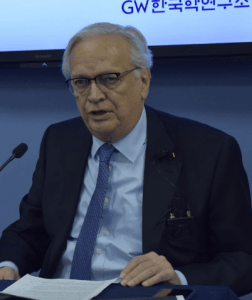
John Merrill (Senior Non-Resident Scholar)
February 1, 2024 – February 1, 2026
Dr. John Merrill is the former chief of the Northeast Asia Division in the State Department’s Bureau of Intelligence and Research. Merrill has taught at the Foreign Service Institute, Johns Hopkins School of Advanced International Studies, Georgetown University, the George Washington University, and Lafayette College. For many years, he chaired seminars on North Korean Foreign Policy for mid-career Intelligence Community analysts/managers. Merrill is the author of Korea: The Peninsular Origins of the War and The Cheju-do Rebellion (in Japanese). His most recent pieces include “Inside the White House: The Future of US-DPRK Policy,” Korea Observer, Winter 2016 and op-eds for Nikkei Asian Review. Merrill has a Ph.D. from the University of Delaware, an M.A. from Harvard University, and a B.A. from Boston University.
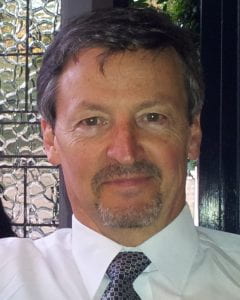
Stephen Costello
March 19, 2021 – March 19, 2026
Mr. Stephen Costello has been immersed in South Korean politics and foreign policy since 1990. He is Director of the policy NGO AsiaEast.Org and columnist with The Korea Times in Seoul. He holds a bachelor’s degree in Public Policy Analysis from Syracuse University. Mr. Costello was formerly director of the Korea Program at the Atlantic Council of the US and director of the Kim Dae Jung Peace Foundation/USA. He was a political consultant and policy advisor to overseas political parties and mayors, and Washington manager for overseas NGOs. He has consulted for small technology businesses in Korea and the US. He has advised ministers and staff at the Foreign and Unification ministries in Seoul and the State Department in Washington. Beyond South Korea, Costello’s focus includes the Korean Peninsula, Northeast Asia, and the US interests in the region. In 2019 and 2020, he will explore Middle Power and infrastructure opportunities surrounding Korea. His column appears at The Korea Times. Twitter: @CostelloScost
Past Scholars
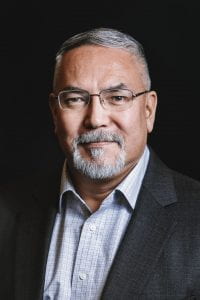
Robert Jensen
January 1, 2020 – January 1, 2025
Bob Jensen brings more than 35 years of experience across a broad spectrum of assignments both inside and outside of the U.S. government, most recently as the Principal Deputy Assistant Secretary for Public Affairs for the U.S. Department of Homeland Security. In his current role he consults with national governments as well as major corporations globally. He provided on-the-ground advice and assistance during major events as well as crisis management and communication training to law enforcement agencies in the U.S. Working with the World Bank, he has advised national governments on risk and crisis management, improving emergency management and developing national public awareness campaigns. He also served as a spokesman for the White House’s National Security Council as well as for the U.S. Embassy in Baghdad. He led the Combined Forces Air Component’s media operations at the start of Operation Iraqi Freedom and led on the ground efforts to assess and improve coalition strategic communication effectiveness in Iraq and Afghanistan during four combat zone deployments.
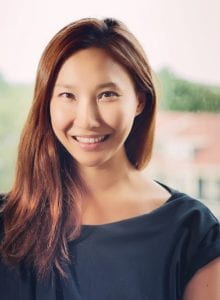
Lami Kim
October 1, 2022 – September 28, 2024
Lami Kim is an Assistant Professor in the Department of National Security and Strategy at the U.S. Army War College. She is also serving as a Security and Statecraft Fellow at the Center for Strategic and International Studies (CSIS), a Mansfield-Luce Asia Scholar, and an Adjunct Fellow at Pacific Forum. Her research interests are nuclear proliferation, the impact of emerging technologies on national/international security, and political and security issues on the Korean Peninsula and East Asia. Her work has appeared in The Washington Quarterly, Global Governance, Bulletin of the Atomic Scientists, War on the Rocks, Belfer Center for Science and International Affairs, the Woodrow Wilson International Center for Scholars, the National Bureau of Asian Research, Routledge, the National Interest, and the Diplomat. She has also provided commentaries to media outlets, such as Washington Post, Newsweek, Time magazine, BBC, Al-Jazeera, and LA Times, among others. She has served as a research fellow at Harvard’s Belfer Center, the Wilson Center, Pacific Forum, and the Stimson Center; as a Nuclear Scholar at CSIS; as a Visiting Fellow at Seoul National University; and also as a South Korean diplomat. She has taught at Harvard University, Boston College, and the University of Hong Kong. She holds a PhD degree from the Fletcher School of Law and Diplomacy at Tufts University and a Master’s degree from Harvard University.
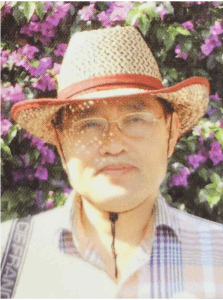
Yonghwan Kim
September 15, 2023 – December 15, 2024
Dr. Young Hwan Kim earned his Ph.D. in Philosophy from Seoul National University in 1989 and served as a Professor at Chungbuk National University for over three decades from 1987 to 2020. Throughout his career, Kim has held various influential positions, including Research Professor at the University of Paris-Sorbonne (1993–1994), Director of Planning and Research at Chungbuk National University (1997-1998), Research Professor at the University of British Columbia (1998-1999), President of the Korean Ethics Educational Association (2011-2012), and Research Professor at George Mason University (2013–2014).
Yong Hwan Kim’s journey in ethics and spirituality finds its roots in the teachings of Korea’s revered figure, Toegye (1501~1570). He emphasized nurturing sensitivity and respect in his pursuit of cultivating human nature’s inherent tendencies. Kim’s commitment to Toegye’s ideals led him to share his insights with the world, primarily through YouTube, where he posts meditative poems aimed at healing and spiritual nourishment.
Professor Kim’s recent publications include including Mandala, the Spiritual World of Enlightenment (Yeol Hwadang, 1991), Confucianism and Religious Studies (Seoul National University Press, 2009), The Values and Ecological Ethics of Post-Modern Society (Chungbuk National University Press, 2009), World Ethics Education (Chungbuk University Press, 2010), Moral Imagination and Donghak’s Public Common Happiness: Serving People (2012), and Longevity Ethics in the Age of Longevity (Chungbuk National University Press, 2019). Kim’s most recent works, Laughing With Loving (Modern Poetry History, 2021) and Be Happy and Awakening (Modern Poetry History, 2022), continue to inspire and enrich the realms of ethics, spirituality, and modern poetry.

Jung-Chul Lee
March 1, 2024 – February 28, 2025
Dr. Jung-Chul Lee is a Professor in the Department of Political Science and International Relations at Seoul National University, concurrently serving as the Chief of the Center for Unification Studies at IPUS (Institute of Peace and Unification Studies, SNU). Before embarking on his research year, he held positions as the Deputy Director of IPUS and Chair of the Interdisciplinary Program for Peace and Unification Studies at SNU. Preceding his tenure at SNU, he served as Professor at Soongsil University and, prior to his professorial career, worked for Samsung Economic Research Institute (SERI, now Samsung Global Research) as Chief of the Economic Security Research Team.
From January 2014 to February 2015, Dr. Lee enriched his academic pursuits as a Visiting Scholar at the Sigur Center for Asian Studies at the George Washington University’s Elliott School of International Affairs. During this period, he delivered a public lecture titled “A Battle for Legitimacy: What Made the North Korean Military-First System Different from Cuba’s Junta System,” based on his research topic, “After Sanctions: What Next for the Korean Peninsula.” Dr. Lee has also contributed as a policy advisor for the Ministry of Unification and various other government departments of the Republic of Korea. He also served as an auditor at the Korea Institute for National Unification (KINU) and as a member of the Advisory Group to the Speaker of the National Assembly of the ROK. He currently holds the position of absentee director at the Defense Agency of Technology and Quality.
Dr. Lee has authored numerous books and articles on North Korea and its nuclear issues, including “Kim Jong-un’s Foreign Policy: A Revisionist State, an Alliance with China or a Third Way?” (book chapter, 2022), A Pendulum Movement Between the Strategic Patience and the Maximum Pressure and Engagement. (Korea National Defense University, 2020), “Sanctions for Nuclear Inhibition: Comparing Sanction Conditions between Iran and North Korea” (Asian Perspective, 2019), and “Making Sense of North Korea: How to Respond to Pyongyang’s Charm Offensive,” (Foreign Affairs, 2015). The article in Foreign Affairs drew from the resources and interviews conducted during his Visiting Scholar tenure at GWU. He holds a Bachelor of Laws degree (LL.B., 1991) and an M.A. in Political Science (1997) from Seoul National University. He completed his Ph.D. in Political Science at Seoul National University in 2002 with a thesis entitled, “The Economic Dynamics and Political System of Socialist North Korea – With respect to the tension between the Dynamics of the Physical Materials and the Dynamics of the Price.”
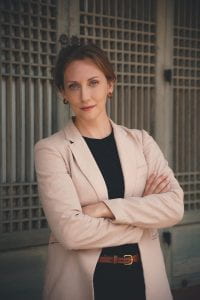
Darcie Draudt
August 4, 2022 – July 31, 2024
Dr. Darcie Draudt is a Postdoctoral Research Associate at the Princeton School of Public and International Affairs. She also holds nonresident fellowships at the George Washington University Institute for Korean Studies (GWIKS), the Korea Economic Institute, and the National Bureau of Asian Research. A political scientist and foreign policy analyst, Dr. Draudt publishes broadly on South and North Korean domestic politics and foreign policy, inter-Korean relations, and U.S.-Korea policy. In 2019 she was a visiting scholar at the Yonsei University Department of Political Science and a Korea Foundation dissertation fieldwork fellow. Draudt was also previously a postdoctoral fellow at GWIKS, research associate for Korea Studies and the Program on US-Korea Policy at the Council on Foreign Relations, a non-resident James A. Kelly Korean Studies fellow at Pacific Forum (formerly Pacific Forum CSIS), and a field researcher for the International Organization for Migration Research and Training Center in South Korea. She holds a PhD in Political Science from the Johns Hopkins University, an MA in Korean Studies from the Yonsei University Graduate School of International Studies, and an AB with Honors in Anthropology from Davidson College. Draudt lived in Seoul, South Korea, from 2008 through 2013.
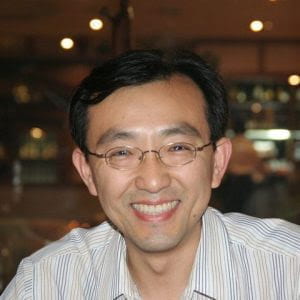
Joongho Kim
August 1, 2020 – July 31, 2022
Dr. Joongho Kim is a non-resident scholar at the George Washington University’s Institute for Korean Studies (GWIKS). His primary research interests include North Korean economic transition, financial strategy for development assistance, and geo-political-economic dynamics in Northeast Asia. Before joining the GWIKS in 2018, he worked as a senior research fellow at the Export-Import Bank of Korea (KEXIM) over 8 years, through which he participated in numerous government projects and task forces regarding strategy making for effective engagement with North Korean economy. Prior to the career at the Bank, he taught at the University of Hawaii at Manoa and also served as a researcher at the Institute of Foreign Affairs & National Security (IFANS) of the ROK Foreign Ministry. He graduated from Sogang University in Seoul, majoring in political science. He received M.A. in international relations at the George Washington University and obtained Ph.D. in political science at the University of Hawaii at Manoa.
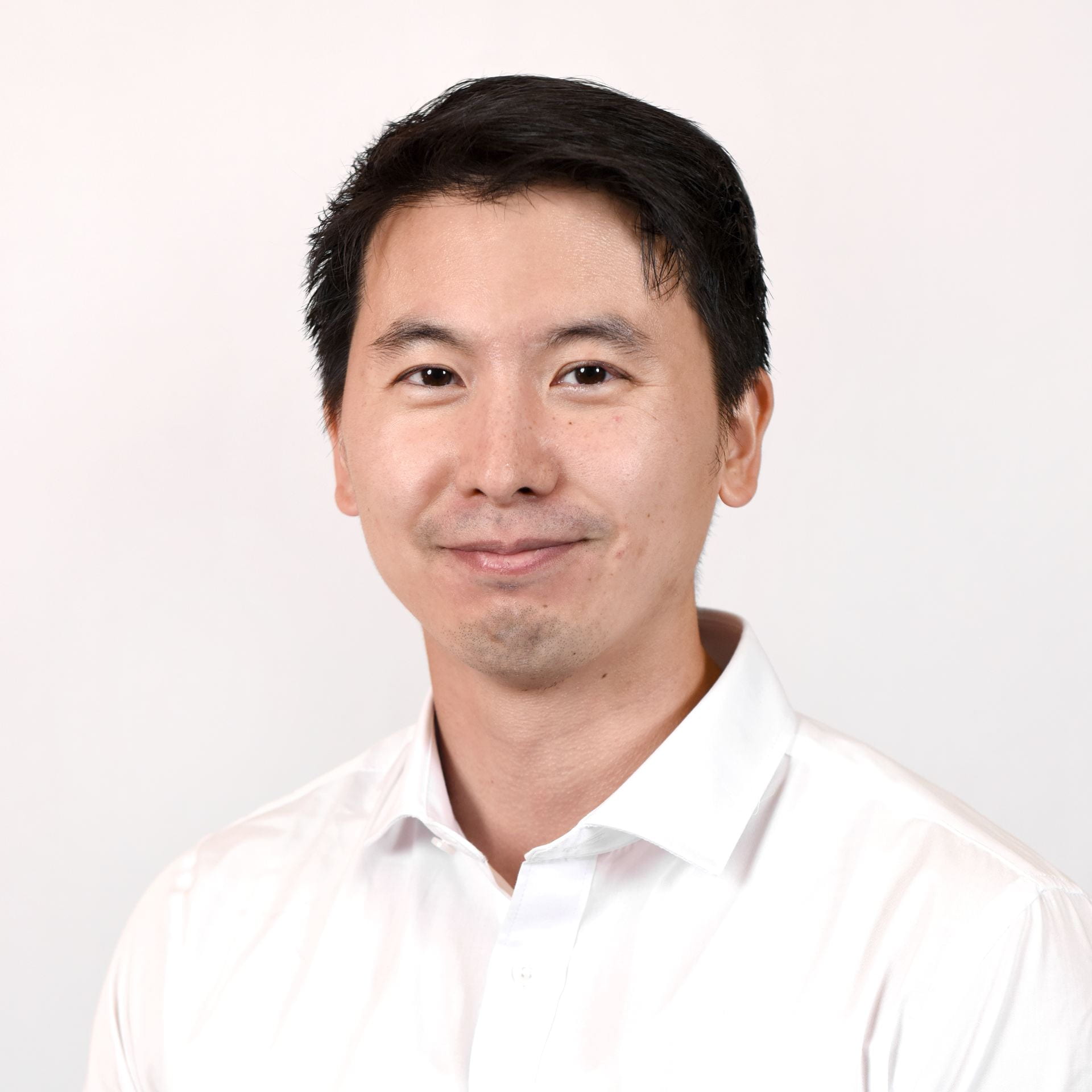
Sungik Yang
September 1, 2023 – August 31, 2024
Sungik Yang is an Assistant Professor of History at Arizona State University’s School of Historical, Philosophical & Religious Studies (SHPRS). He is a political and intellectual historian of modern Korea, focusing on nationalism, historical memory, the history of democracy, and the content and dissemination of political ideology in Korea. His current book project, tentatively titled Korea’s Fascist Moment, examines the discursive hegemony of fascistic nationalism, anti-Westernism, and collectivism in Korea during the twentieth century, particularly after liberation from Japanese colonial rule in 1945. He is also interested in researching the rise and fall of Korean Cold War liberalism, the conceptual history of democracy in Korea, and South Korea’s regional diplomacy during the Cold War. He received his PhD in History and East Asian Languages at Harvard University, where he also received his AM in the Regional Studies-East Asia program, and received his BA in History and Political Science at Williams College
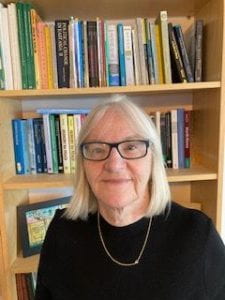
Hazel Smith
September 21, 2023 – September 20, 2024
Professor Hazel Smith is Professorial Research Associate in Korean Studies at the School of Oriental and African Studies, University of London, Professor Emeritus in International Security at Cranfield University and Advisory fellow at the North Korea Economic Studies section of the Korea Development Institute (KDI). Professor Smith has researched and published on North Korea’s international relations, domestic politics, economic and society of North Korea for over 30 years. She received her PhD in International Relations from the London School of Economics, beginning her academic career at the University of Kent where she was Director of the London Centre of International Relations before moving to the University of Warwick, where she directed the Master’s course in International Relations for ten years, and was appointed full Chair and Professor of International Relations in 2002. Professor Smith served as Director of the University’s International Resilience Centre at Cranfield University; and then appointed by UCLAN as Director of the International Institute of Korean Studies which she founded and established, and which is now the largest Centre of Korean Studies in the UK. Professor Smith has been awarded multiple competitive international fellowships; including at the Woodrow Wilson International Center for Scholars (2019/20 and 2012/2013), the East-West Center, Honolulu (2008 and 2015), Kyushu University, the United States Institute of Peace (2001/2002), and Stanford University (1994/95). Professor Smith’s recent publications include ‘The return of famine to North Korea? An evidence-based assessment of the economic and humanitarian impact of United Nation sanctions’, in Suk Lee (ed). DPRK Sanctions. Seoul. KDI. 2022;The impact of sanctions on international humanitarian assistance to the DPRK. ONN-CENESS, Vienna, 2022; North Korea’s Food Security Strategy: Analytically Flawed, Inherently Fragile, in Robert Carlin and Chung-in Moon (eds). Understanding Kim Jong-un’s North Korea: Regime Dynamics, Negotiation, and Engagement, Lanham: Lexington, 2022); The ethics of United Nations sanctions on North Korea: effectiveness, necessity and proportionality, Critical Asian Studies, 52 (2), 2020; North Korea: Markets and Military Rule (Cambridge University Press, 2015). Professor Smith is regularly called on to advise government agencies worldwide and international organisations, and isa frequent broadcaster for global media on North Korea and East Asian security. Professor Smith lived in North Korea for two years while working for UN WFP and UNICEF; earning a (still valid) North Korean driving license.
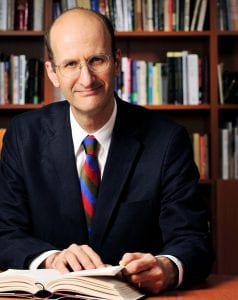
Emanuel Pastreich
September 25, 2019 – September 25, 2021
Emanuel Pastreich founded the Asia Institute in 2007, a think tank that considers the interplay of technology, the environment and culture with a focus on East Asia. His research work concerns the convergence of technologies in an age of unprecedented technological change and its implications for society and security. At the same time, he continues his original research on the classical novel in China, Japan and Korea. Pastreich has published three books in English: The Novels of Park Jiwon: Translation of Overlook Worlds (Seoul National University Press), The Observable Mundane: Vernacular Chinese and the Emergence of a Discourse on Popular Narrative in Edo Japan (Seoul National University Press) and Earth Management: A Dialogue on Ancient Korean Wisdom and Its Lessons for a New Earth (Best Life Media). Pastreich has written articles about the environment, technology, globalization, international relations and business in Asia for such journals as Japan Focus, Foreign Policy in Focus, Korea Times, Huffington Post Japan and the Harvard Journal of Asiatic Studies. He has also published five books in Korean, two books in Chinese and one book in Japanese. Emanuel Pastreich graduated in the major of Chinese literature from Yale’s Department of East Asian Languages & Literatures in 1987. He has an M.A. in comparative literature from the University of Tokyo (1992) and a Ph.D. in comparative Asian literature from Harvard University (1998). He served as assistant professor of Japanese literature at the University of Illinois, Urbana-Champaign (1998-2005) and professor at the College of International Studies at Kyung Hee University (2011-2018) in South Korea.

